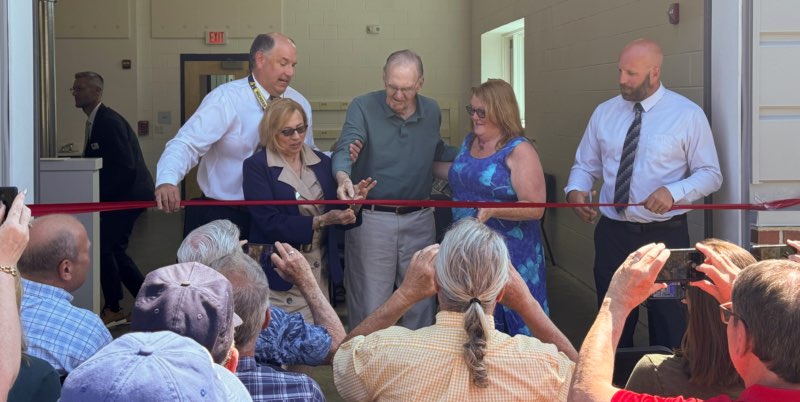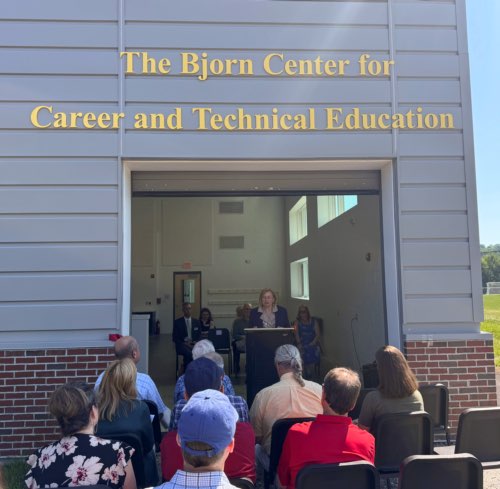Bjorn Center for Career & Technical Education Center funded in part by $240,000 from the State of Maine
Farmington, MAINE – Governor Janet Mills today celebrated the opening of a new career and technical education (CTE) center in Farmington that was funded by the State of Maine in part and will prepare middle school students to succeed in good-paying careers in the trades.
The Bjorn Career and Technical Education Center will provide high-quality CTE programming to hundreds of students each year at Mt. Blue Middle School, with the goal of expanding offerings in wood and metal work, robotics, and culinary arts, among other existing courses. The facility will allow students to begin exploring careers in the trades and developing lifelong skills that they can continue to strengthen at the Foster CTE Center at Mt. Blue High School.

The Bjorn Center, located in a newly constructed wing at Mt. Blue Middle School, was made possible by a generous $2.8 million donation from Farmington businessman Dick Bjorn and $240,000 in education funding from the State of Maine. The Franklin County Commission has also dedicated $130,000 to the project.
“The Bjorn Career and Technical Education Center will enable hundreds of Mt. Blue Middle School students learn the skills they need to go on to successful, good-paying careers right here in Maine,” said Governor Janet Mills. “I thank my friend Dick Bjorn for this life-changing investment for Maine kids. My Administration will continue to build upon our record investments to expand career and technical education across the state.”
“Career and Technical Education offers students hands-on, real-world learning opportunities that set them up for success in their lives and careers. These programs have long been a powerful learning pathway for high school students, and we’re thrilled that Mt. Blue is able to expand these deeply engaging programs for middle school students,” said Maine Education Commissioner Pender Makin. “Mt. Blue Middle School students will be able to use their hands and minds to explore their passions, learn about career opportunities, and gain a solid foundation they can build upon during high school and beyond. The Department is committed to further expanding Career and Technical Education for middle and high school students across Maine.”
Governor Mills has long been a champion of career and technical education programs. Under her leadership, enrollment in CTE programs has grown by nearly 11 percent, with an almost 300 percent increase in exploratory program enrollment that allow high school freshman and sophomores to sample multiple programs to follow their interests. The Governor’s most recent biennial budget proposal included $500,000 to expand programming at Maine Middle Schools.

The Governor and the Legislature have increased CTEs by nearly $10 million over the last five years, including a $1.6 million investment to assist in the increased costs of supplies and $100,000 to expand CTE early childhood education programs.
Through her Maine Jobs & Recovery Plan, Governor Mills has invested $20 million expand CTEs across the State, including $4.5 million in awards to 23 CTE programs to purchase and upgrade equipment to enhance student learning experiences and career preparation for high-skilled, in-demand industries.
Last year, the Governor awarded $15 million from her Jobs Plan to help CTE schools in Biddeford, Lincoln, Mexico, and Norway conduct extensive program, equipment, and facility upgrades.
As Attorney General, Governor Mills used funds she obtained through a settlement with Bath Fitter to create plumbing programs at four CTEs in Maine, including Oxford Hills Technical School in Norway, Foster Career and Technical Education Center in Farmington, Lewiston Regional Technical Center in Lewiston, and Biddeford Regional Center of Technology in Biddeford.
Maine’s 27 Career and Technical Education regions and centers enroll more than 9,800 students in 85 programs. Students learn skills and gain real-world experiences in programs ranging from plumbing and welding to culinary arts and early childhood education while completing high school. Many students are able to receive industry accreditation, earn college credits through dual-enrollment opportunities, and they graduate with the skills and knowledge they need to succeed in the job market and higher education.